Social Welfare Analysis: Privatisation of the British Rail
VerifiedAdded on 2022/11/30
|14
|2973
|249
AI Summary
This research proposal focuses on the social welfare perspectives of the privatisation of the British Rail. It aims to examine the implications of privatisation on social welfare and evaluate its effectiveness.
Contribute Materials
Your contribution can guide someone’s learning journey. Share your
documents today.
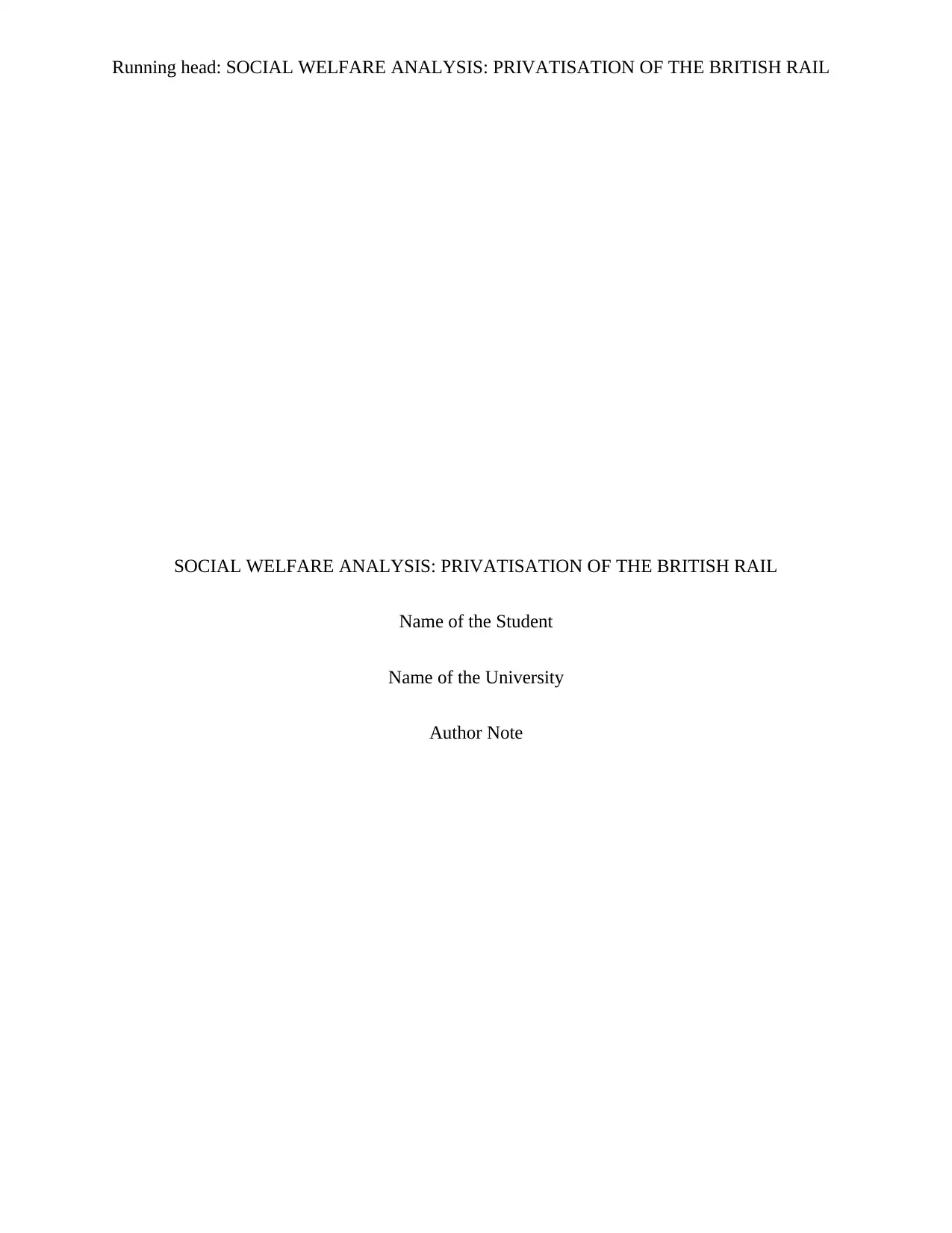
Running head: SOCIAL WELFARE ANALYSIS: PRIVATISATION OF THE BRITISH RAIL
SOCIAL WELFARE ANALYSIS: PRIVATISATION OF THE BRITISH RAIL
Name of the Student
Name of the University
Author Note
SOCIAL WELFARE ANALYSIS: PRIVATISATION OF THE BRITISH RAIL
Name of the Student
Name of the University
Author Note
Secure Best Marks with AI Grader
Need help grading? Try our AI Grader for instant feedback on your assignments.
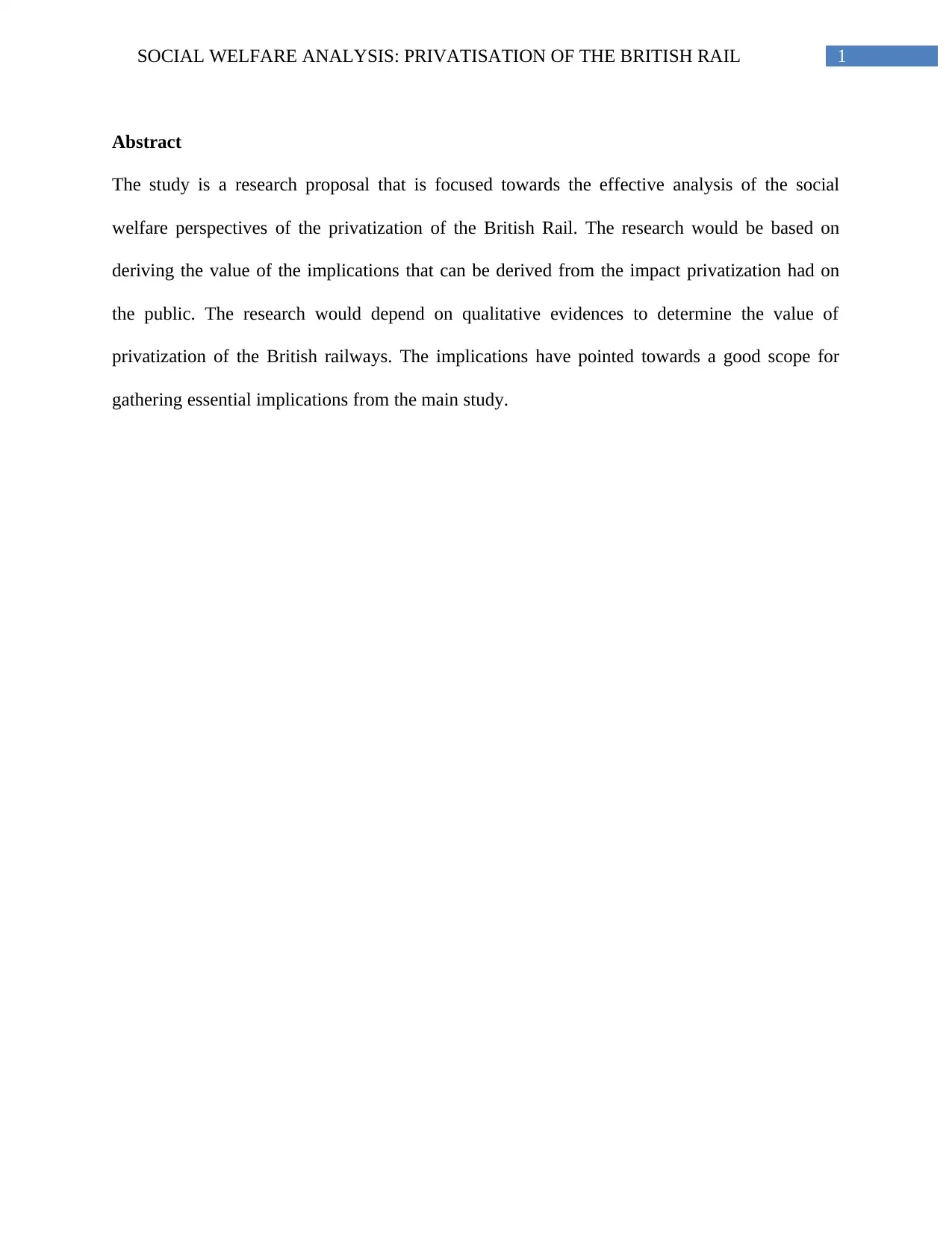
1SOCIAL WELFARE ANALYSIS: PRIVATISATION OF THE BRITISH RAIL
Abstract
The study is a research proposal that is focused towards the effective analysis of the social
welfare perspectives of the privatization of the British Rail. The research would be based on
deriving the value of the implications that can be derived from the impact privatization had on
the public. The research would depend on qualitative evidences to determine the value of
privatization of the British railways. The implications have pointed towards a good scope for
gathering essential implications from the main study.
Abstract
The study is a research proposal that is focused towards the effective analysis of the social
welfare perspectives of the privatization of the British Rail. The research would be based on
deriving the value of the implications that can be derived from the impact privatization had on
the public. The research would depend on qualitative evidences to determine the value of
privatization of the British railways. The implications have pointed towards a good scope for
gathering essential implications from the main study.
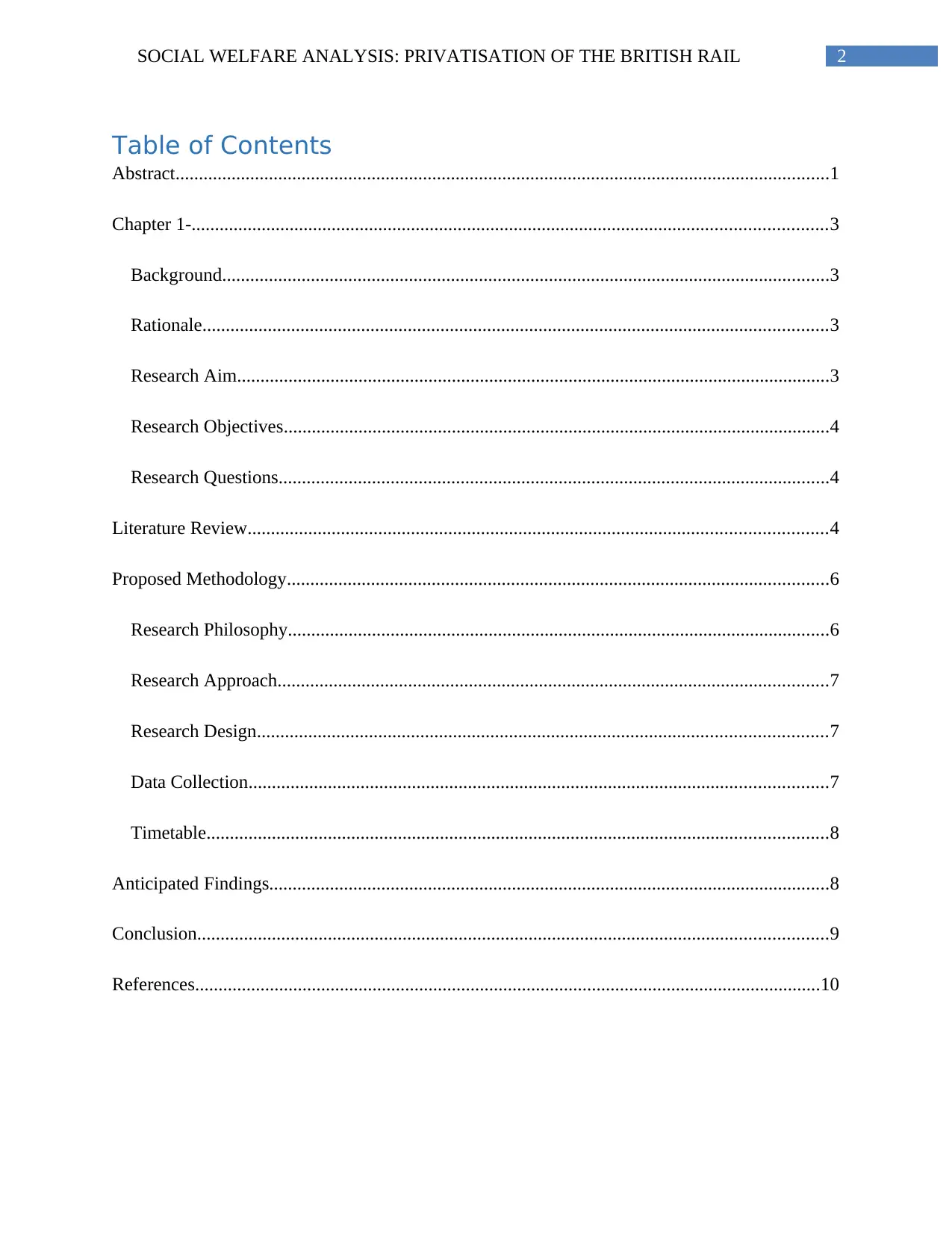
2SOCIAL WELFARE ANALYSIS: PRIVATISATION OF THE BRITISH RAIL
Table of Contents
Abstract............................................................................................................................................1
Chapter 1-........................................................................................................................................3
Background..................................................................................................................................3
Rationale......................................................................................................................................3
Research Aim...............................................................................................................................3
Research Objectives.....................................................................................................................4
Research Questions......................................................................................................................4
Literature Review............................................................................................................................4
Proposed Methodology....................................................................................................................6
Research Philosophy....................................................................................................................6
Research Approach......................................................................................................................7
Research Design..........................................................................................................................7
Data Collection............................................................................................................................7
Timetable.....................................................................................................................................8
Anticipated Findings........................................................................................................................8
Conclusion.......................................................................................................................................9
References......................................................................................................................................10
Table of Contents
Abstract............................................................................................................................................1
Chapter 1-........................................................................................................................................3
Background..................................................................................................................................3
Rationale......................................................................................................................................3
Research Aim...............................................................................................................................3
Research Objectives.....................................................................................................................4
Research Questions......................................................................................................................4
Literature Review............................................................................................................................4
Proposed Methodology....................................................................................................................6
Research Philosophy....................................................................................................................6
Research Approach......................................................................................................................7
Research Design..........................................................................................................................7
Data Collection............................................................................................................................7
Timetable.....................................................................................................................................8
Anticipated Findings........................................................................................................................8
Conclusion.......................................................................................................................................9
References......................................................................................................................................10
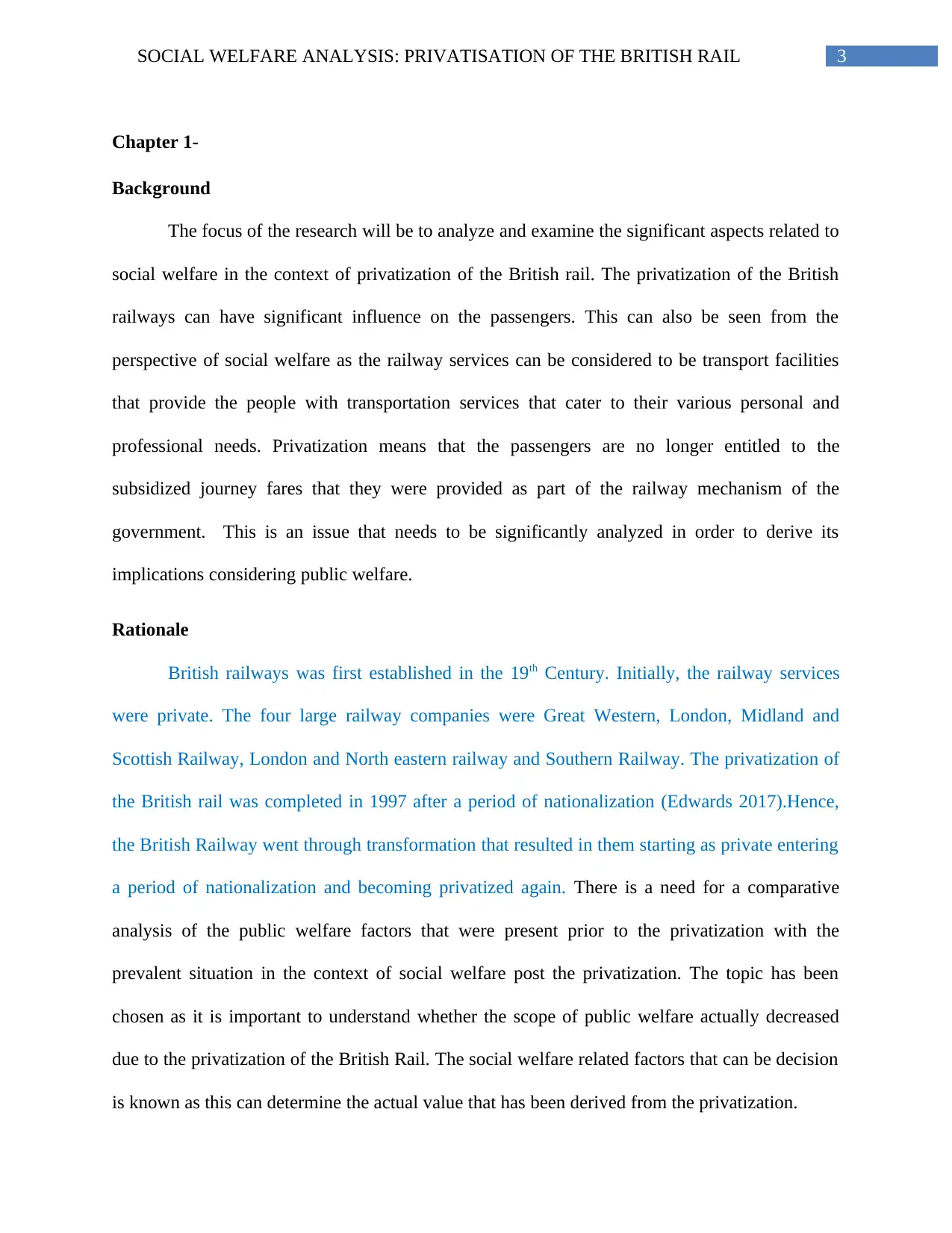
3SOCIAL WELFARE ANALYSIS: PRIVATISATION OF THE BRITISH RAIL
Chapter 1-
Background
The focus of the research will be to analyze and examine the significant aspects related to
social welfare in the context of privatization of the British rail. The privatization of the British
railways can have significant influence on the passengers. This can also be seen from the
perspective of social welfare as the railway services can be considered to be transport facilities
that provide the people with transportation services that cater to their various personal and
professional needs. Privatization means that the passengers are no longer entitled to the
subsidized journey fares that they were provided as part of the railway mechanism of the
government. This is an issue that needs to be significantly analyzed in order to derive its
implications considering public welfare.
Rationale
British railways was first established in the 19th Century. Initially, the railway services
were private. The four large railway companies were Great Western, London, Midland and
Scottish Railway, London and North eastern railway and Southern Railway. The privatization of
the British rail was completed in 1997 after a period of nationalization (Edwards 2017).Hence,
the British Railway went through transformation that resulted in them starting as private entering
a period of nationalization and becoming privatized again. There is a need for a comparative
analysis of the public welfare factors that were present prior to the privatization with the
prevalent situation in the context of social welfare post the privatization. The topic has been
chosen as it is important to understand whether the scope of public welfare actually decreased
due to the privatization of the British Rail. The social welfare related factors that can be decision
is known as this can determine the actual value that has been derived from the privatization.
Chapter 1-
Background
The focus of the research will be to analyze and examine the significant aspects related to
social welfare in the context of privatization of the British rail. The privatization of the British
railways can have significant influence on the passengers. This can also be seen from the
perspective of social welfare as the railway services can be considered to be transport facilities
that provide the people with transportation services that cater to their various personal and
professional needs. Privatization means that the passengers are no longer entitled to the
subsidized journey fares that they were provided as part of the railway mechanism of the
government. This is an issue that needs to be significantly analyzed in order to derive its
implications considering public welfare.
Rationale
British railways was first established in the 19th Century. Initially, the railway services
were private. The four large railway companies were Great Western, London, Midland and
Scottish Railway, London and North eastern railway and Southern Railway. The privatization of
the British rail was completed in 1997 after a period of nationalization (Edwards 2017).Hence,
the British Railway went through transformation that resulted in them starting as private entering
a period of nationalization and becoming privatized again. There is a need for a comparative
analysis of the public welfare factors that were present prior to the privatization with the
prevalent situation in the context of social welfare post the privatization. The topic has been
chosen as it is important to understand whether the scope of public welfare actually decreased
due to the privatization of the British Rail. The social welfare related factors that can be decision
is known as this can determine the actual value that has been derived from the privatization.
Secure Best Marks with AI Grader
Need help grading? Try our AI Grader for instant feedback on your assignments.
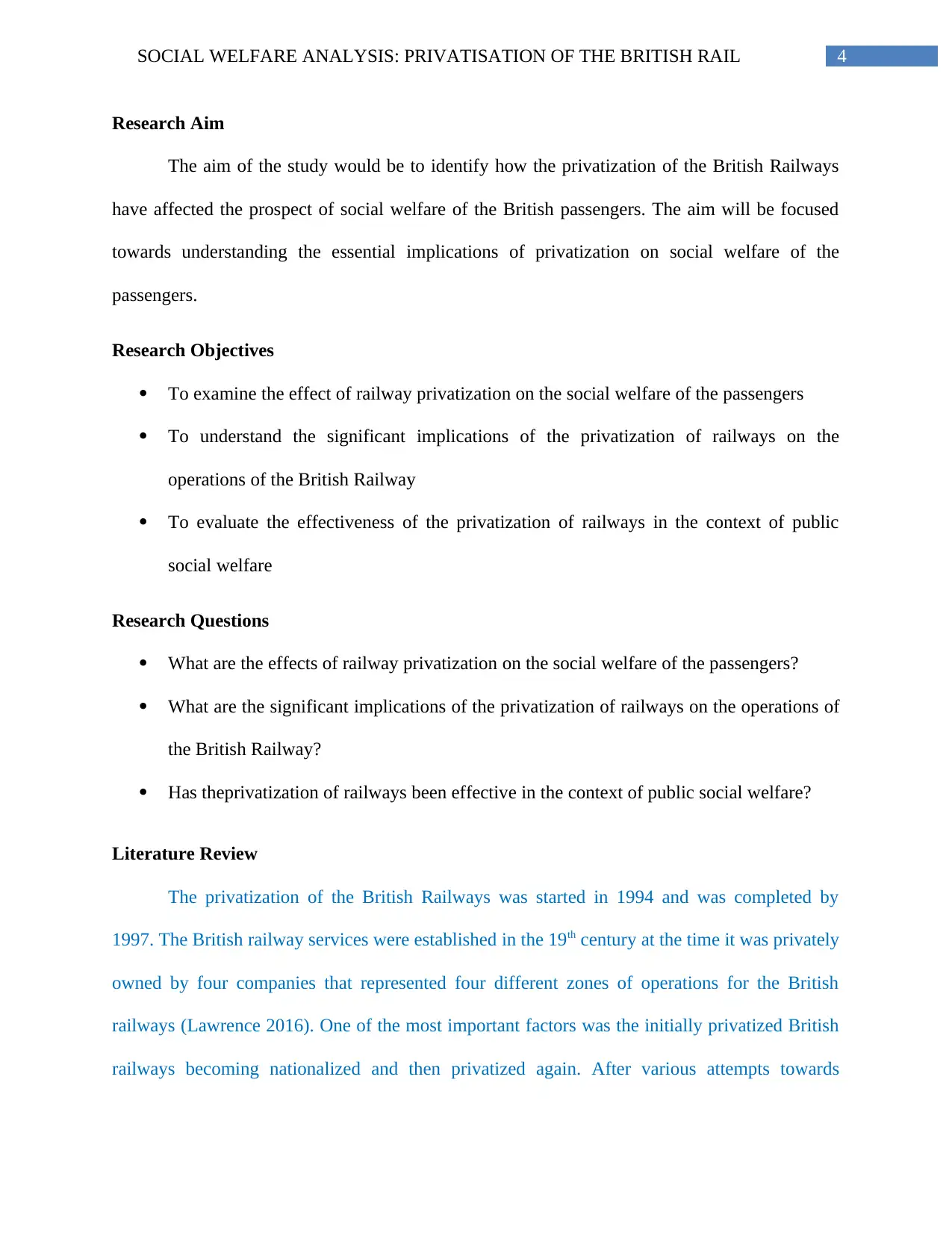
4SOCIAL WELFARE ANALYSIS: PRIVATISATION OF THE BRITISH RAIL
Research Aim
The aim of the study would be to identify how the privatization of the British Railways
have affected the prospect of social welfare of the British passengers. The aim will be focused
towards understanding the essential implications of privatization on social welfare of the
passengers.
Research Objectives
To examine the effect of railway privatization on the social welfare of the passengers
To understand the significant implications of the privatization of railways on the
operations of the British Railway
To evaluate the effectiveness of the privatization of railways in the context of public
social welfare
Research Questions
What are the effects of railway privatization on the social welfare of the passengers?
What are the significant implications of the privatization of railways on the operations of
the British Railway?
Has theprivatization of railways been effective in the context of public social welfare?
Literature Review
The privatization of the British Railways was started in 1994 and was completed by
1997. The British railway services were established in the 19th century at the time it was privately
owned by four companies that represented four different zones of operations for the British
railways (Lawrence 2016). One of the most important factors was the initially privatized British
railways becoming nationalized and then privatized again. After various attempts towards
Research Aim
The aim of the study would be to identify how the privatization of the British Railways
have affected the prospect of social welfare of the British passengers. The aim will be focused
towards understanding the essential implications of privatization on social welfare of the
passengers.
Research Objectives
To examine the effect of railway privatization on the social welfare of the passengers
To understand the significant implications of the privatization of railways on the
operations of the British Railway
To evaluate the effectiveness of the privatization of railways in the context of public
social welfare
Research Questions
What are the effects of railway privatization on the social welfare of the passengers?
What are the significant implications of the privatization of railways on the operations of
the British Railway?
Has theprivatization of railways been effective in the context of public social welfare?
Literature Review
The privatization of the British Railways was started in 1994 and was completed by
1997. The British railway services were established in the 19th century at the time it was privately
owned by four companies that represented four different zones of operations for the British
railways (Lawrence 2016). One of the most important factors was the initially privatized British
railways becoming nationalized and then privatized again. After various attempts towards
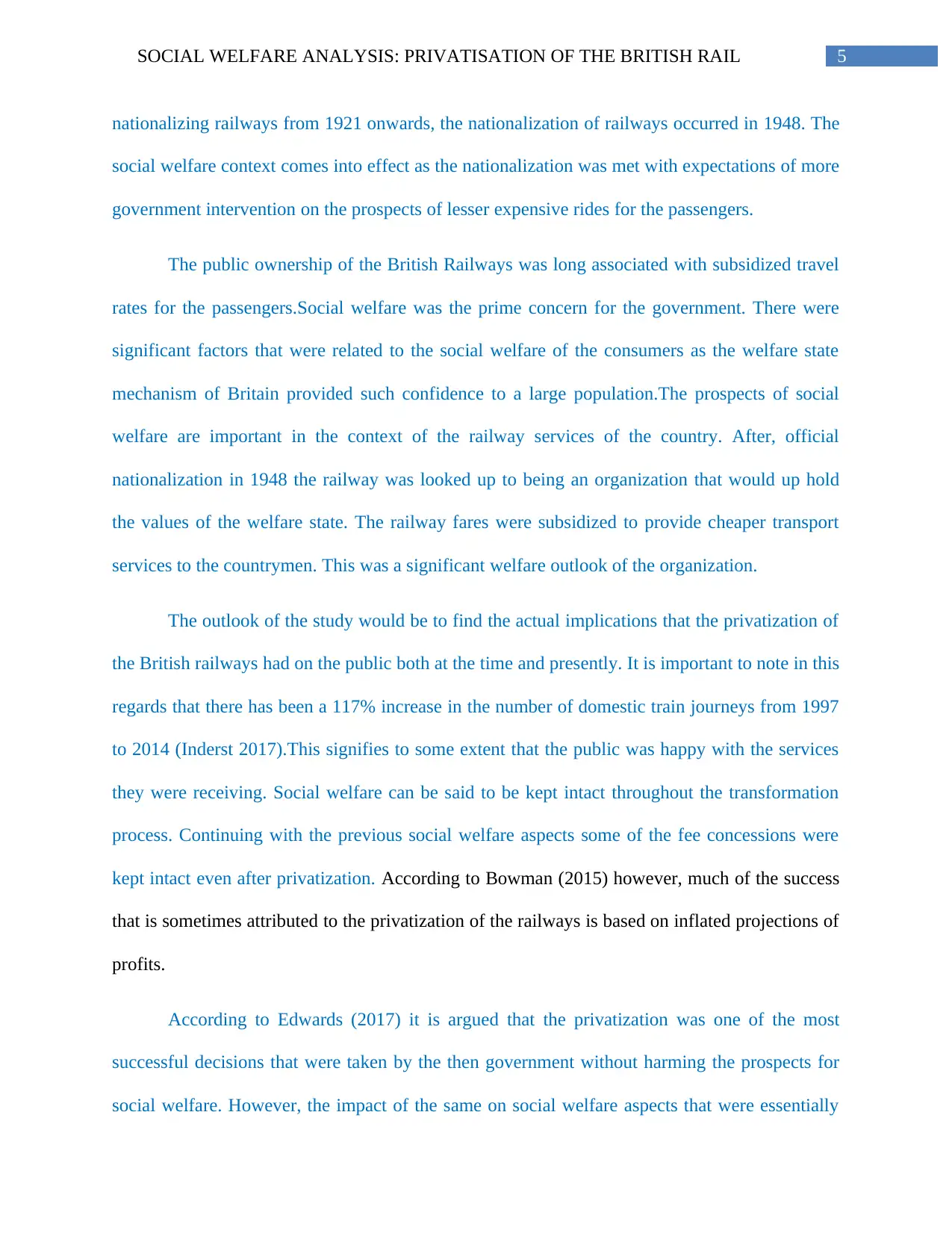
5SOCIAL WELFARE ANALYSIS: PRIVATISATION OF THE BRITISH RAIL
nationalizing railways from 1921 onwards, the nationalization of railways occurred in 1948. The
social welfare context comes into effect as the nationalization was met with expectations of more
government intervention on the prospects of lesser expensive rides for the passengers.
The public ownership of the British Railways was long associated with subsidized travel
rates for the passengers.Social welfare was the prime concern for the government. There were
significant factors that were related to the social welfare of the consumers as the welfare state
mechanism of Britain provided such confidence to a large population.The prospects of social
welfare are important in the context of the railway services of the country. After, official
nationalization in 1948 the railway was looked up to being an organization that would up hold
the values of the welfare state. The railway fares were subsidized to provide cheaper transport
services to the countrymen. This was a significant welfare outlook of the organization.
The outlook of the study would be to find the actual implications that the privatization of
the British railways had on the public both at the time and presently. It is important to note in this
regards that there has been a 117% increase in the number of domestic train journeys from 1997
to 2014 (Inderst 2017).This signifies to some extent that the public was happy with the services
they were receiving. Social welfare can be said to be kept intact throughout the transformation
process. Continuing with the previous social welfare aspects some of the fee concessions were
kept intact even after privatization. According to Bowman (2015) however, much of the success
that is sometimes attributed to the privatization of the railways is based on inflated projections of
profits.
According to Edwards (2017) it is argued that the privatization was one of the most
successful decisions that were taken by the then government without harming the prospects for
social welfare. However, the impact of the same on social welfare aspects that were essentially
nationalizing railways from 1921 onwards, the nationalization of railways occurred in 1948. The
social welfare context comes into effect as the nationalization was met with expectations of more
government intervention on the prospects of lesser expensive rides for the passengers.
The public ownership of the British Railways was long associated with subsidized travel
rates for the passengers.Social welfare was the prime concern for the government. There were
significant factors that were related to the social welfare of the consumers as the welfare state
mechanism of Britain provided such confidence to a large population.The prospects of social
welfare are important in the context of the railway services of the country. After, official
nationalization in 1948 the railway was looked up to being an organization that would up hold
the values of the welfare state. The railway fares were subsidized to provide cheaper transport
services to the countrymen. This was a significant welfare outlook of the organization.
The outlook of the study would be to find the actual implications that the privatization of
the British railways had on the public both at the time and presently. It is important to note in this
regards that there has been a 117% increase in the number of domestic train journeys from 1997
to 2014 (Inderst 2017).This signifies to some extent that the public was happy with the services
they were receiving. Social welfare can be said to be kept intact throughout the transformation
process. Continuing with the previous social welfare aspects some of the fee concessions were
kept intact even after privatization. According to Bowman (2015) however, much of the success
that is sometimes attributed to the privatization of the railways is based on inflated projections of
profits.
According to Edwards (2017) it is argued that the privatization was one of the most
successful decisions that were taken by the then government without harming the prospects for
social welfare. However, the impact of the same on social welfare aspects that were essentially
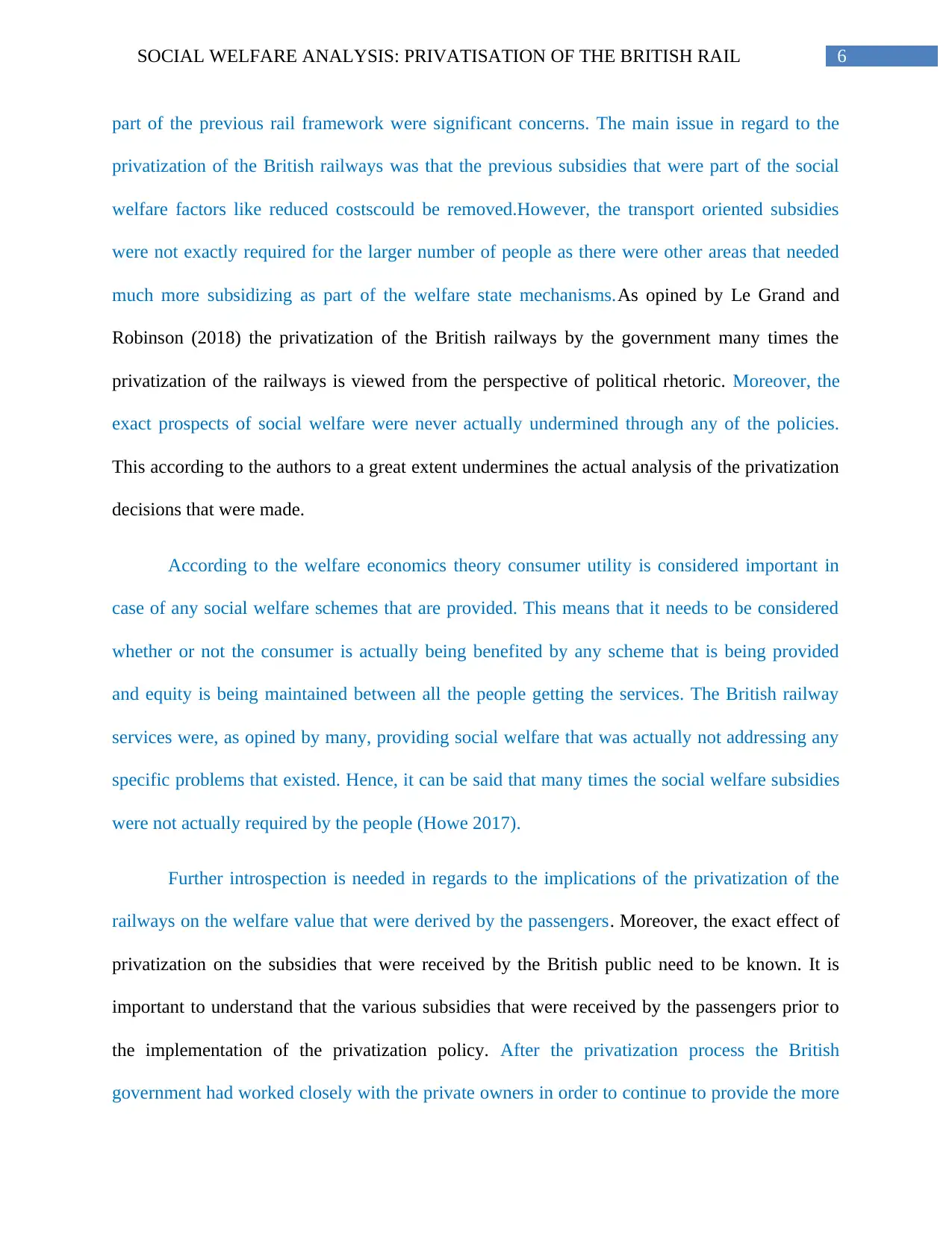
6SOCIAL WELFARE ANALYSIS: PRIVATISATION OF THE BRITISH RAIL
part of the previous rail framework were significant concerns. The main issue in regard to the
privatization of the British railways was that the previous subsidies that were part of the social
welfare factors like reduced costscould be removed.However, the transport oriented subsidies
were not exactly required for the larger number of people as there were other areas that needed
much more subsidizing as part of the welfare state mechanisms.As opined by Le Grand and
Robinson (2018) the privatization of the British railways by the government many times the
privatization of the railways is viewed from the perspective of political rhetoric. Moreover, the
exact prospects of social welfare were never actually undermined through any of the policies.
This according to the authors to a great extent undermines the actual analysis of the privatization
decisions that were made.
According to the welfare economics theory consumer utility is considered important in
case of any social welfare schemes that are provided. This means that it needs to be considered
whether or not the consumer is actually being benefited by any scheme that is being provided
and equity is being maintained between all the people getting the services. The British railway
services were, as opined by many, providing social welfare that was actually not addressing any
specific problems that existed. Hence, it can be said that many times the social welfare subsidies
were not actually required by the people (Howe 2017).
Further introspection is needed in regards to the implications of the privatization of the
railways on the welfare value that were derived by the passengers. Moreover, the exact effect of
privatization on the subsidies that were received by the British public need to be known. It is
important to understand that the various subsidies that were received by the passengers prior to
the implementation of the privatization policy. After the privatization process the British
government had worked closely with the private owners in order to continue to provide the more
part of the previous rail framework were significant concerns. The main issue in regard to the
privatization of the British railways was that the previous subsidies that were part of the social
welfare factors like reduced costscould be removed.However, the transport oriented subsidies
were not exactly required for the larger number of people as there were other areas that needed
much more subsidizing as part of the welfare state mechanisms.As opined by Le Grand and
Robinson (2018) the privatization of the British railways by the government many times the
privatization of the railways is viewed from the perspective of political rhetoric. Moreover, the
exact prospects of social welfare were never actually undermined through any of the policies.
This according to the authors to a great extent undermines the actual analysis of the privatization
decisions that were made.
According to the welfare economics theory consumer utility is considered important in
case of any social welfare schemes that are provided. This means that it needs to be considered
whether or not the consumer is actually being benefited by any scheme that is being provided
and equity is being maintained between all the people getting the services. The British railway
services were, as opined by many, providing social welfare that was actually not addressing any
specific problems that existed. Hence, it can be said that many times the social welfare subsidies
were not actually required by the people (Howe 2017).
Further introspection is needed in regards to the implications of the privatization of the
railways on the welfare value that were derived by the passengers. Moreover, the exact effect of
privatization on the subsidies that were received by the British public need to be known. It is
important to understand that the various subsidies that were received by the passengers prior to
the implementation of the privatization policy. After the privatization process the British
government had worked closely with the private owners in order to continue to provide the more
Paraphrase This Document
Need a fresh take? Get an instant paraphrase of this document with our AI Paraphraser
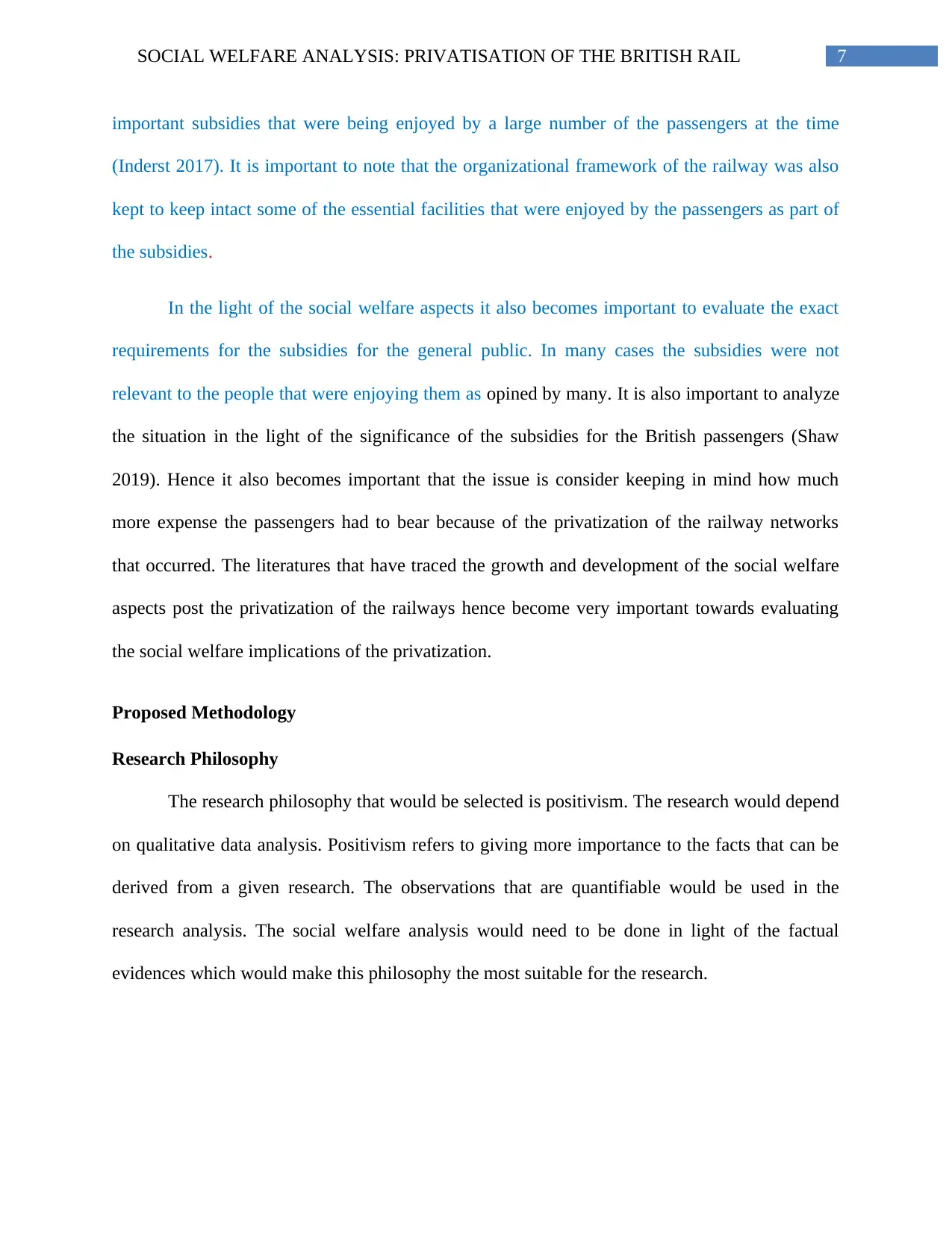
7SOCIAL WELFARE ANALYSIS: PRIVATISATION OF THE BRITISH RAIL
important subsidies that were being enjoyed by a large number of the passengers at the time
(Inderst 2017). It is important to note that the organizational framework of the railway was also
kept to keep intact some of the essential facilities that were enjoyed by the passengers as part of
the subsidies.
In the light of the social welfare aspects it also becomes important to evaluate the exact
requirements for the subsidies for the general public. In many cases the subsidies were not
relevant to the people that were enjoying them as opined by many. It is also important to analyze
the situation in the light of the significance of the subsidies for the British passengers (Shaw
2019). Hence it also becomes important that the issue is consider keeping in mind how much
more expense the passengers had to bear because of the privatization of the railway networks
that occurred. The literatures that have traced the growth and development of the social welfare
aspects post the privatization of the railways hence become very important towards evaluating
the social welfare implications of the privatization.
Proposed Methodology
Research Philosophy
The research philosophy that would be selected is positivism. The research would depend
on qualitative data analysis. Positivism refers to giving more importance to the facts that can be
derived from a given research. The observations that are quantifiable would be used in the
research analysis. The social welfare analysis would need to be done in light of the factual
evidences which would make this philosophy the most suitable for the research.
important subsidies that were being enjoyed by a large number of the passengers at the time
(Inderst 2017). It is important to note that the organizational framework of the railway was also
kept to keep intact some of the essential facilities that were enjoyed by the passengers as part of
the subsidies.
In the light of the social welfare aspects it also becomes important to evaluate the exact
requirements for the subsidies for the general public. In many cases the subsidies were not
relevant to the people that were enjoying them as opined by many. It is also important to analyze
the situation in the light of the significance of the subsidies for the British passengers (Shaw
2019). Hence it also becomes important that the issue is consider keeping in mind how much
more expense the passengers had to bear because of the privatization of the railway networks
that occurred. The literatures that have traced the growth and development of the social welfare
aspects post the privatization of the railways hence become very important towards evaluating
the social welfare implications of the privatization.
Proposed Methodology
Research Philosophy
The research philosophy that would be selected is positivism. The research would depend
on qualitative data analysis. Positivism refers to giving more importance to the facts that can be
derived from a given research. The observations that are quantifiable would be used in the
research analysis. The social welfare analysis would need to be done in light of the factual
evidences which would make this philosophy the most suitable for the research.
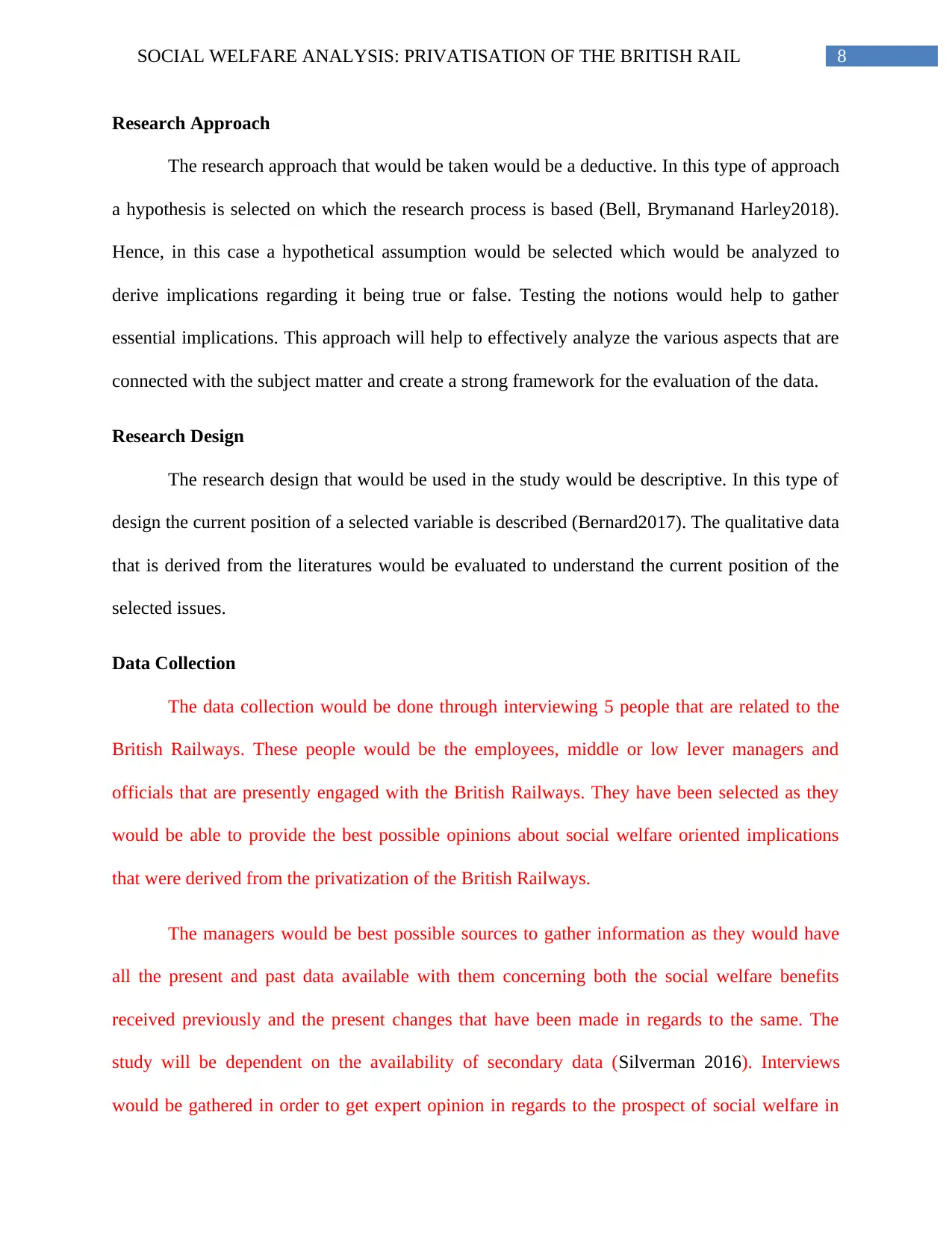
8SOCIAL WELFARE ANALYSIS: PRIVATISATION OF THE BRITISH RAIL
Research Approach
The research approach that would be taken would be a deductive. In this type of approach
a hypothesis is selected on which the research process is based (Bell, Brymanand Harley2018).
Hence, in this case a hypothetical assumption would be selected which would be analyzed to
derive implications regarding it being true or false. Testing the notions would help to gather
essential implications. This approach will help to effectively analyze the various aspects that are
connected with the subject matter and create a strong framework for the evaluation of the data.
Research Design
The research design that would be used in the study would be descriptive. In this type of
design the current position of a selected variable is described (Bernard2017). The qualitative data
that is derived from the literatures would be evaluated to understand the current position of the
selected issues.
Data Collection
The data collection would be done through interviewing 5 people that are related to the
British Railways. These people would be the employees, middle or low lever managers and
officials that are presently engaged with the British Railways. They have been selected as they
would be able to provide the best possible opinions about social welfare oriented implications
that were derived from the privatization of the British Railways.
The managers would be best possible sources to gather information as they would have
all the present and past data available with them concerning both the social welfare benefits
received previously and the present changes that have been made in regards to the same. The
study will be dependent on the availability of secondary data (Silverman 2016). Interviews
would be gathered in order to get expert opinion in regards to the prospect of social welfare in
Research Approach
The research approach that would be taken would be a deductive. In this type of approach
a hypothesis is selected on which the research process is based (Bell, Brymanand Harley2018).
Hence, in this case a hypothetical assumption would be selected which would be analyzed to
derive implications regarding it being true or false. Testing the notions would help to gather
essential implications. This approach will help to effectively analyze the various aspects that are
connected with the subject matter and create a strong framework for the evaluation of the data.
Research Design
The research design that would be used in the study would be descriptive. In this type of
design the current position of a selected variable is described (Bernard2017). The qualitative data
that is derived from the literatures would be evaluated to understand the current position of the
selected issues.
Data Collection
The data collection would be done through interviewing 5 people that are related to the
British Railways. These people would be the employees, middle or low lever managers and
officials that are presently engaged with the British Railways. They have been selected as they
would be able to provide the best possible opinions about social welfare oriented implications
that were derived from the privatization of the British Railways.
The managers would be best possible sources to gather information as they would have
all the present and past data available with them concerning both the social welfare benefits
received previously and the present changes that have been made in regards to the same. The
study will be dependent on the availability of secondary data (Silverman 2016). Interviews
would be gathered in order to get expert opinion in regards to the prospect of social welfare in
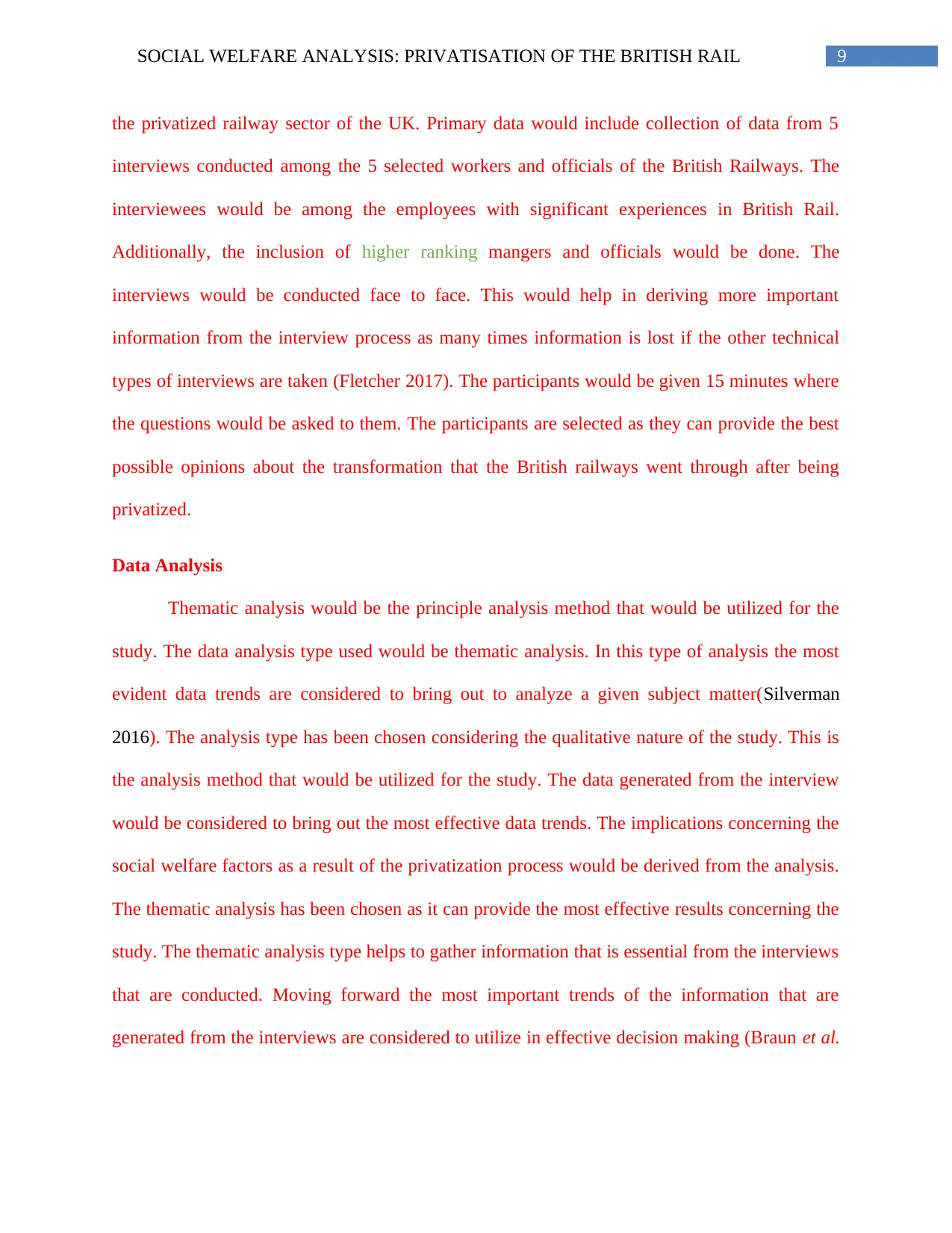
9SOCIAL WELFARE ANALYSIS: PRIVATISATION OF THE BRITISH RAIL
the privatized railway sector of the UK. Primary data would include collection of data from 5
interviews conducted among the 5 selected workers and officials of the British Railways. The
interviewees would be among the employees with significant experiences in British Rail.
Additionally, the inclusion of higher ranking mangers and officials would be done. The
interviews would be conducted face to face. This would help in deriving more important
information from the interview process as many times information is lost if the other technical
types of interviews are taken (Fletcher 2017). The participants would be given 15 minutes where
the questions would be asked to them. The participants are selected as they can provide the best
possible opinions about the transformation that the British railways went through after being
privatized.
Data Analysis
Thematic analysis would be the principle analysis method that would be utilized for the
study. The data analysis type used would be thematic analysis. In this type of analysis the most
evident data trends are considered to bring out to analyze a given subject matter(Silverman
2016). The analysis type has been chosen considering the qualitative nature of the study. This is
the analysis method that would be utilized for the study. The data generated from the interview
would be considered to bring out the most effective data trends. The implications concerning the
social welfare factors as a result of the privatization process would be derived from the analysis.
The thematic analysis has been chosen as it can provide the most effective results concerning the
study. The thematic analysis type helps to gather information that is essential from the interviews
that are conducted. Moving forward the most important trends of the information that are
generated from the interviews are considered to utilize in effective decision making (Braun et al.
the privatized railway sector of the UK. Primary data would include collection of data from 5
interviews conducted among the 5 selected workers and officials of the British Railways. The
interviewees would be among the employees with significant experiences in British Rail.
Additionally, the inclusion of higher ranking mangers and officials would be done. The
interviews would be conducted face to face. This would help in deriving more important
information from the interview process as many times information is lost if the other technical
types of interviews are taken (Fletcher 2017). The participants would be given 15 minutes where
the questions would be asked to them. The participants are selected as they can provide the best
possible opinions about the transformation that the British railways went through after being
privatized.
Data Analysis
Thematic analysis would be the principle analysis method that would be utilized for the
study. The data analysis type used would be thematic analysis. In this type of analysis the most
evident data trends are considered to bring out to analyze a given subject matter(Silverman
2016). The analysis type has been chosen considering the qualitative nature of the study. This is
the analysis method that would be utilized for the study. The data generated from the interview
would be considered to bring out the most effective data trends. The implications concerning the
social welfare factors as a result of the privatization process would be derived from the analysis.
The thematic analysis has been chosen as it can provide the most effective results concerning the
study. The thematic analysis type helps to gather information that is essential from the interviews
that are conducted. Moving forward the most important trends of the information that are
generated from the interviews are considered to utilize in effective decision making (Braun et al.
Secure Best Marks with AI Grader
Need help grading? Try our AI Grader for instant feedback on your assignments.
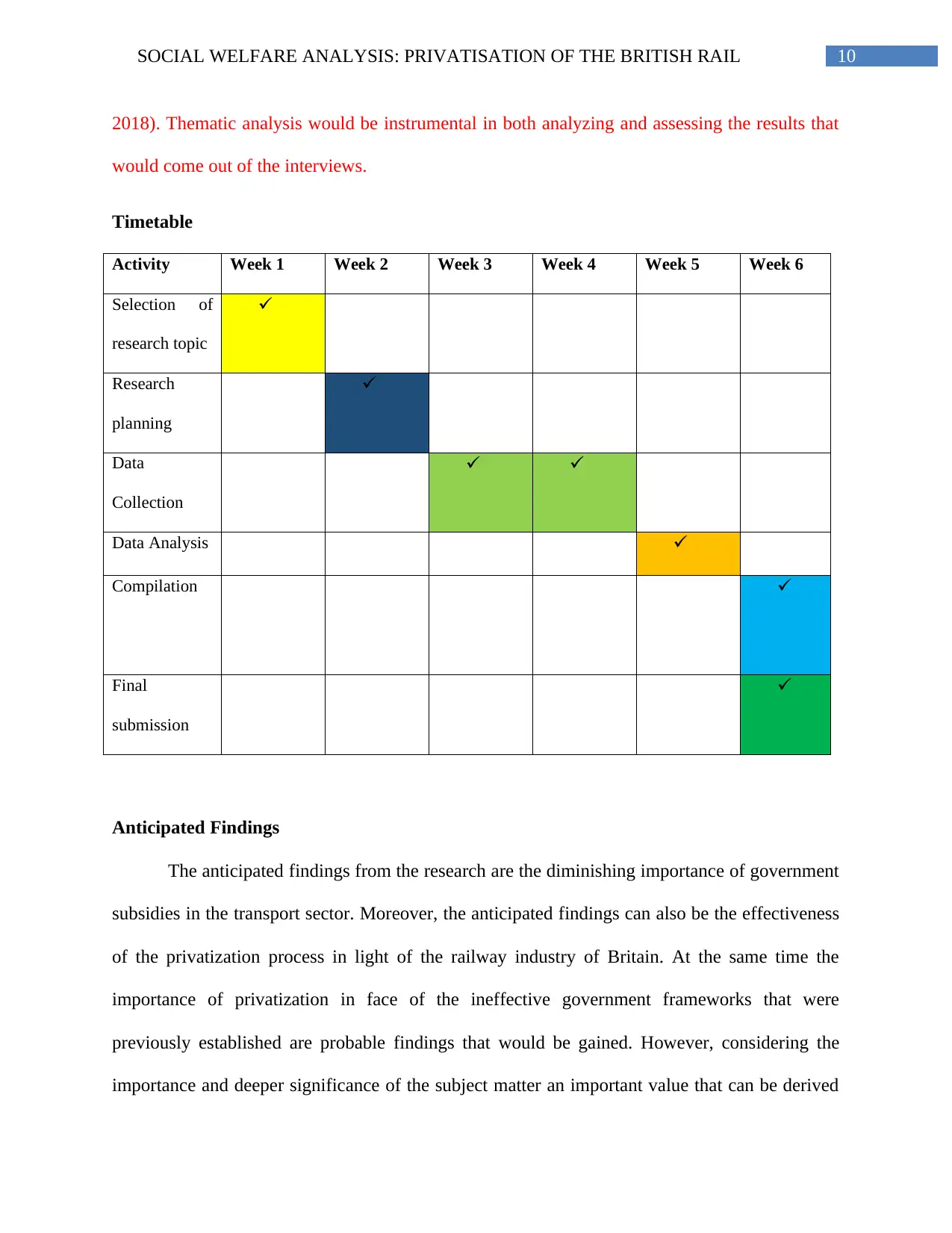
10SOCIAL WELFARE ANALYSIS: PRIVATISATION OF THE BRITISH RAIL
2018). Thematic analysis would be instrumental in both analyzing and assessing the results that
would come out of the interviews.
Timetable
Activity Week 1 Week 2 Week 3 Week 4 Week 5 Week 6
Selection of
research topic
Research
planning
Data
Collection
Data Analysis
Compilation
Final
submission
Anticipated Findings
The anticipated findings from the research are the diminishing importance of government
subsidies in the transport sector. Moreover, the anticipated findings can also be the effectiveness
of the privatization process in light of the railway industry of Britain. At the same time the
importance of privatization in face of the ineffective government frameworks that were
previously established are probable findings that would be gained. However, considering the
importance and deeper significance of the subject matter an important value that can be derived
2018). Thematic analysis would be instrumental in both analyzing and assessing the results that
would come out of the interviews.
Timetable
Activity Week 1 Week 2 Week 3 Week 4 Week 5 Week 6
Selection of
research topic
Research
planning
Data
Collection
Data Analysis
Compilation
Final
submission
Anticipated Findings
The anticipated findings from the research are the diminishing importance of government
subsidies in the transport sector. Moreover, the anticipated findings can also be the effectiveness
of the privatization process in light of the railway industry of Britain. At the same time the
importance of privatization in face of the ineffective government frameworks that were
previously established are probable findings that would be gained. However, considering the
importance and deeper significance of the subject matter an important value that can be derived
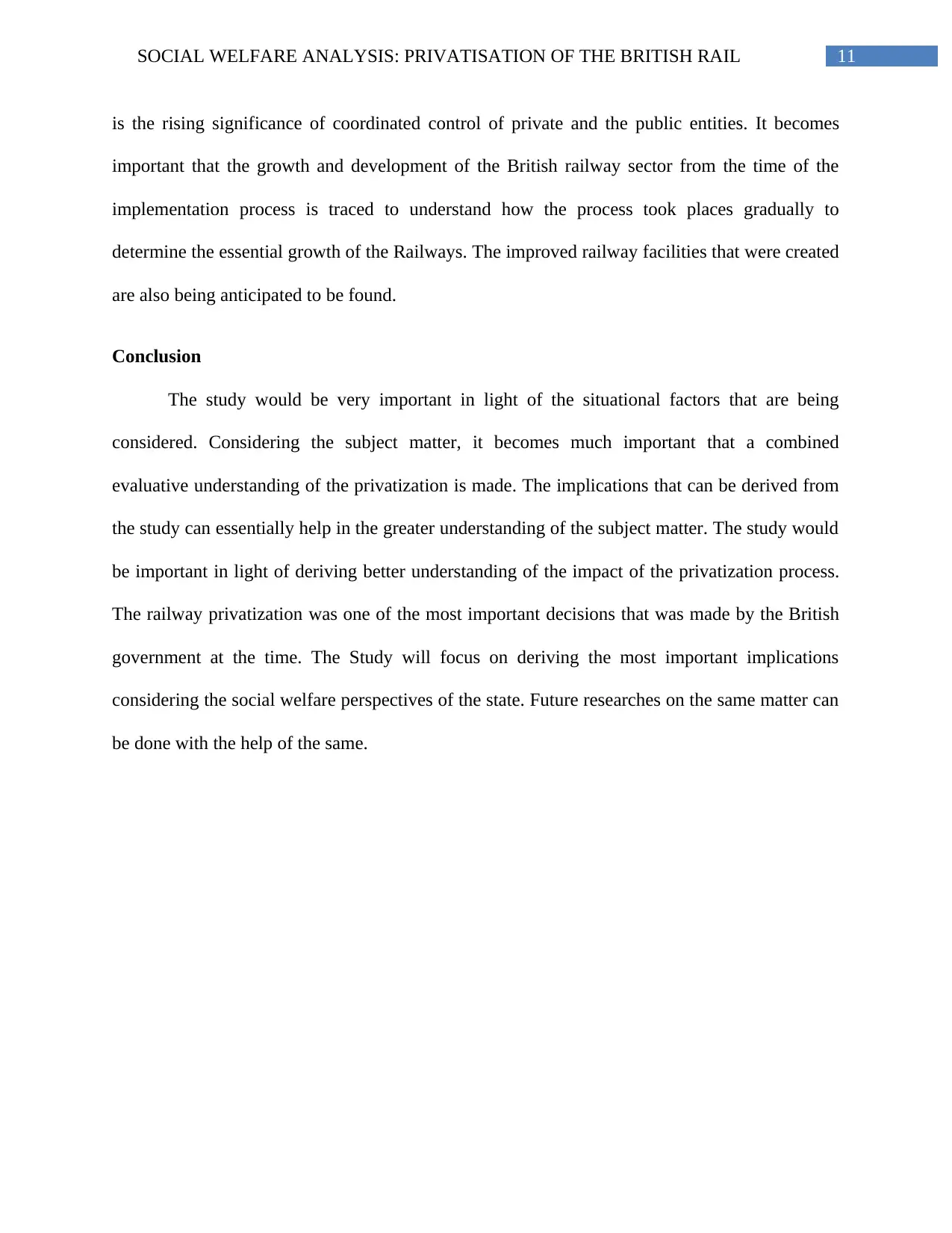
11SOCIAL WELFARE ANALYSIS: PRIVATISATION OF THE BRITISH RAIL
is the rising significance of coordinated control of private and the public entities. It becomes
important that the growth and development of the British railway sector from the time of the
implementation process is traced to understand how the process took places gradually to
determine the essential growth of the Railways. The improved railway facilities that were created
are also being anticipated to be found.
Conclusion
The study would be very important in light of the situational factors that are being
considered. Considering the subject matter, it becomes much important that a combined
evaluative understanding of the privatization is made. The implications that can be derived from
the study can essentially help in the greater understanding of the subject matter. The study would
be important in light of deriving better understanding of the impact of the privatization process.
The railway privatization was one of the most important decisions that was made by the British
government at the time. The Study will focus on deriving the most important implications
considering the social welfare perspectives of the state. Future researches on the same matter can
be done with the help of the same.
is the rising significance of coordinated control of private and the public entities. It becomes
important that the growth and development of the British railway sector from the time of the
implementation process is traced to understand how the process took places gradually to
determine the essential growth of the Railways. The improved railway facilities that were created
are also being anticipated to be found.
Conclusion
The study would be very important in light of the situational factors that are being
considered. Considering the subject matter, it becomes much important that a combined
evaluative understanding of the privatization is made. The implications that can be derived from
the study can essentially help in the greater understanding of the subject matter. The study would
be important in light of deriving better understanding of the impact of the privatization process.
The railway privatization was one of the most important decisions that was made by the British
government at the time. The Study will focus on deriving the most important implications
considering the social welfare perspectives of the state. Future researches on the same matter can
be done with the help of the same.
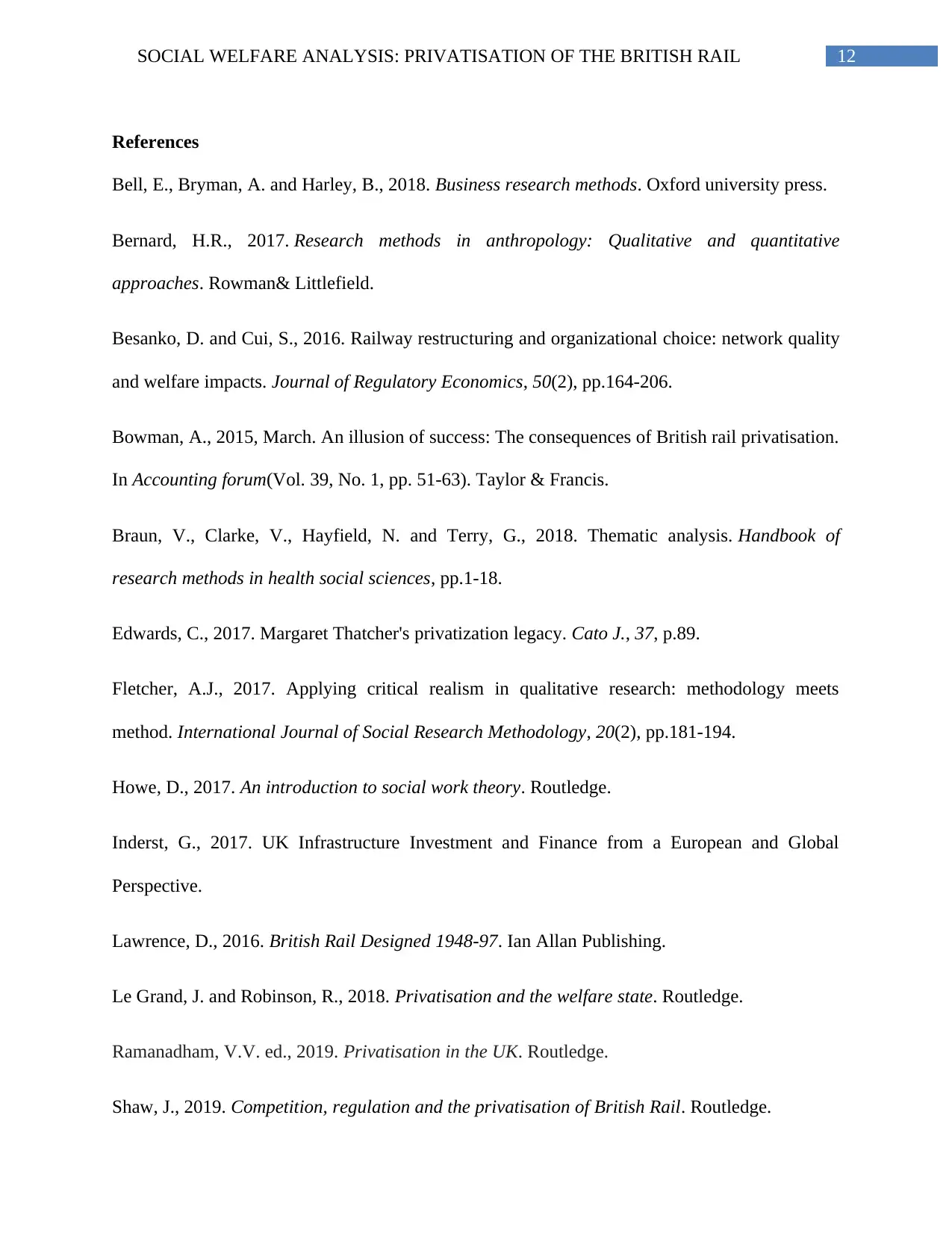
12SOCIAL WELFARE ANALYSIS: PRIVATISATION OF THE BRITISH RAIL
References
Bell, E., Bryman, A. and Harley, B., 2018. Business research methods. Oxford university press.
Bernard, H.R., 2017. Research methods in anthropology: Qualitative and quantitative
approaches. Rowman& Littlefield.
Besanko, D. and Cui, S., 2016. Railway restructuring and organizational choice: network quality
and welfare impacts. Journal of Regulatory Economics, 50(2), pp.164-206.
Bowman, A., 2015, March. An illusion of success: The consequences of British rail privatisation.
In Accounting forum(Vol. 39, No. 1, pp. 51-63). Taylor & Francis.
Braun, V., Clarke, V., Hayfield, N. and Terry, G., 2018. Thematic analysis. Handbook of
research methods in health social sciences, pp.1-18.
Edwards, C., 2017. Margaret Thatcher's privatization legacy. Cato J., 37, p.89.
Fletcher, A.J., 2017. Applying critical realism in qualitative research: methodology meets
method. International Journal of Social Research Methodology, 20(2), pp.181-194.
Howe, D., 2017. An introduction to social work theory. Routledge.
Inderst, G., 2017. UK Infrastructure Investment and Finance from a European and Global
Perspective.
Lawrence, D., 2016. British Rail Designed 1948-97. Ian Allan Publishing.
Le Grand, J. and Robinson, R., 2018. Privatisation and the welfare state. Routledge.
Ramanadham, V.V. ed., 2019. Privatisation in the UK. Routledge.
Shaw, J., 2019. Competition, regulation and the privatisation of British Rail. Routledge.
References
Bell, E., Bryman, A. and Harley, B., 2018. Business research methods. Oxford university press.
Bernard, H.R., 2017. Research methods in anthropology: Qualitative and quantitative
approaches. Rowman& Littlefield.
Besanko, D. and Cui, S., 2016. Railway restructuring and organizational choice: network quality
and welfare impacts. Journal of Regulatory Economics, 50(2), pp.164-206.
Bowman, A., 2015, March. An illusion of success: The consequences of British rail privatisation.
In Accounting forum(Vol. 39, No. 1, pp. 51-63). Taylor & Francis.
Braun, V., Clarke, V., Hayfield, N. and Terry, G., 2018. Thematic analysis. Handbook of
research methods in health social sciences, pp.1-18.
Edwards, C., 2017. Margaret Thatcher's privatization legacy. Cato J., 37, p.89.
Fletcher, A.J., 2017. Applying critical realism in qualitative research: methodology meets
method. International Journal of Social Research Methodology, 20(2), pp.181-194.
Howe, D., 2017. An introduction to social work theory. Routledge.
Inderst, G., 2017. UK Infrastructure Investment and Finance from a European and Global
Perspective.
Lawrence, D., 2016. British Rail Designed 1948-97. Ian Allan Publishing.
Le Grand, J. and Robinson, R., 2018. Privatisation and the welfare state. Routledge.
Ramanadham, V.V. ed., 2019. Privatisation in the UK. Routledge.
Shaw, J., 2019. Competition, regulation and the privatisation of British Rail. Routledge.
Paraphrase This Document
Need a fresh take? Get an instant paraphrase of this document with our AI Paraphraser

13SOCIAL WELFARE ANALYSIS: PRIVATISATION OF THE BRITISH RAIL
Silverman, D. ed., 2016. Qualitative research. Sage.
Silverman, D. ed., 2016. Qualitative research. Sage.
1 out of 14
Related Documents
Your All-in-One AI-Powered Toolkit for Academic Success.
+13062052269
info@desklib.com
Available 24*7 on WhatsApp / Email
![[object Object]](/_next/static/media/star-bottom.7253800d.svg)
Unlock your academic potential
© 2024 | Zucol Services PVT LTD | All rights reserved.





